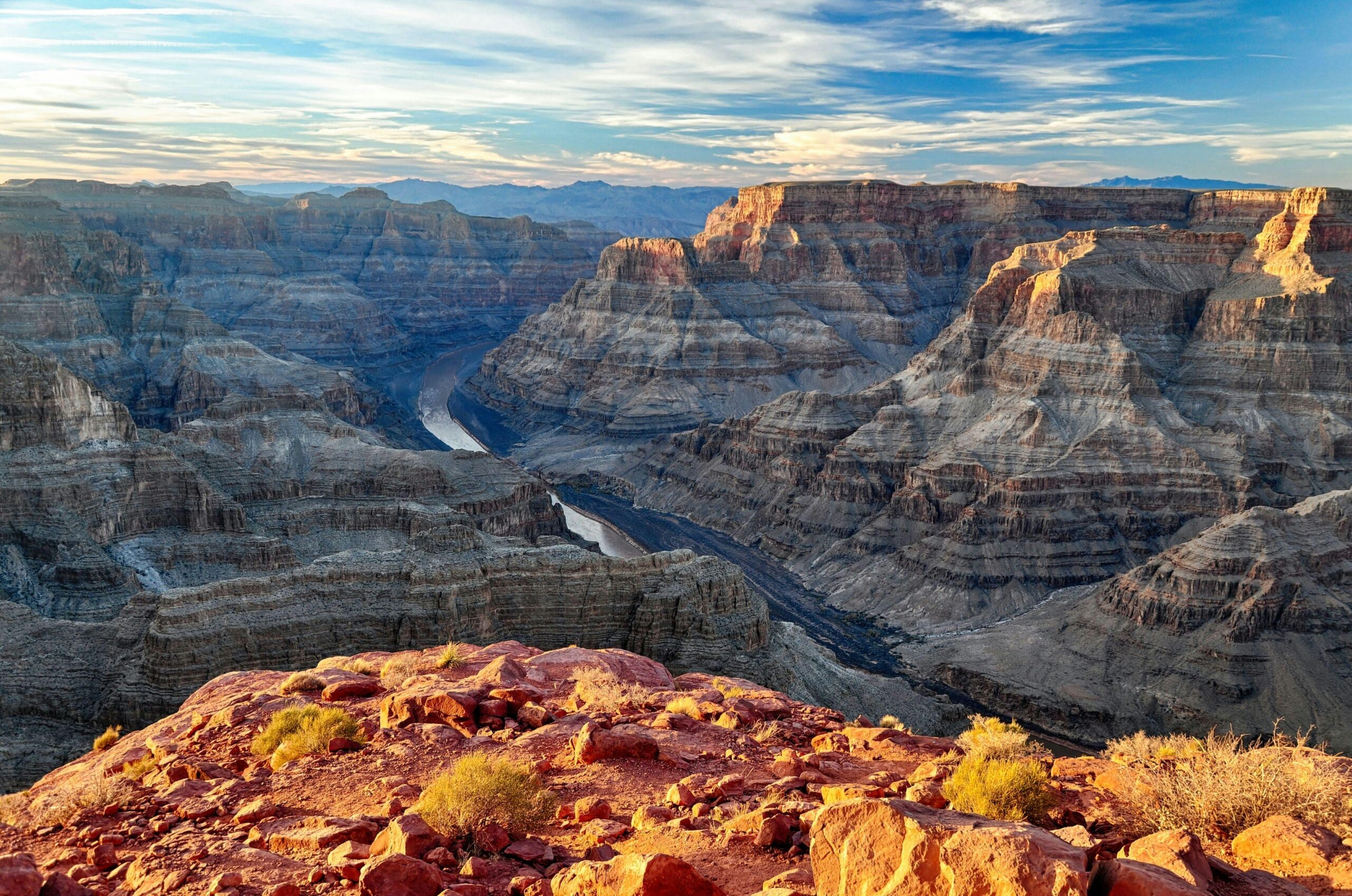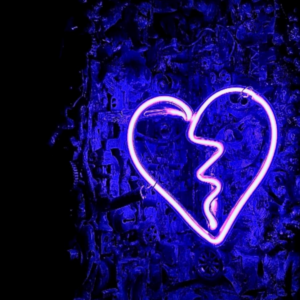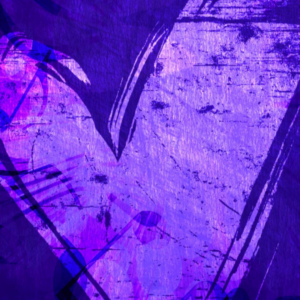The first time you see the Grand Canyon, you’re ten years old on a trip with your parents. You walk up to the railing and look out over it and say, “It’s big.” Your mother sighs, as if you’ve disappointed her with your reaction. But it is big, so big that it renders meaningless any words that would try to capture its scale.
The second time you see it, you’re eighteen and the Grand Canyon is on the morning news. It’s vanished from the Arizona desert and reappeared in the Mississippi River valley, obliterating most of downtown St. Louis and a sizable chunk of southern Illinois.
You come downstairs and your parents are glued to the TV, where a news helicopter captures an overhead view of the canyon. In the lower left-hand corner, a newscaster talks about a hundred and eight people who were overnighting in the canyon before it zipped itself up. Your dad mutters something about the hundreds of thousands of missing people here being a little more important.
You, you’re thinking about just one person.
You take out your phone and check your texts. The last one you received from Nathan was yesterday morning, and it was a good one. Nathan gets up before you do, even on weekends, and works out. He sometimes sends you a selfie. Yesterday’s was just his T-shirt, gray, dark with sweat. You can only see the tip of his chin. Sometimes he’s sent you a face pic, his cheeks flushed from exertion. Once, he sent you a shirtless picture. That one made you lurch out of bed and lock your bedroom door before crashing back onto the bed and yanking down your shorts.
You sent him a reply after yesterday morning’s, and he clicked the thumbs-up emoji. He’s been silent ever since.
He lives on the Illinois side, but you can’t remember the name of the town. Belleville, maybe, or Collinsville. Caseyville? Something-ville.
Your mother looks away from the TV and, when she sees you, gasps.
“We didn’t think—” she begins, but then stalls out, like she’s not sure what she and your dad were thinking.
“We figured we should let you sleep,” he says. “While you could.”
Something in your gut clenches. You go outside.
The sky is full of helicopters, their blades thudding the air and the sound making your ears feel as if they’re going to pop. You look to your left and see Patrick walking across the lawn. You have history and biology together. He says something, but you don’t hear him at first. When you ask him to repeat himself, he uses the tone of voice you might use with a five-year-old.
“I said, they’ve canceled school.” Patrick shoves his hands in his pockets. “I haven’t even started that paper for Steinmetz’s class yet.”
You finished your paper last week. He asks if you think you’ll have to go back to school tomorrow. Does it even matter? As if life could possibly keep going on the same way after this.
Later, you’ll realize the world can keep going on, turning its face toward and away from the sun as certain as indifference. Even a wound in the landscape like the one to the east can become accepted, acceptable, its existence worked into a new reality whether you want it to or not.
Your friend Reese likes Patrick. Every once in a while, she bugs you to find out if Patrick likes her, but you’re pretty sure Patrick doesn’t think about Reese that way. Reese is popular, after all, beautiful, a cheerleader and president of the Honor Society, but also swears like a sailor and is prone to self-doubt, like her own ability to walk up to Patrick and ask him out.
She’s become your best friend over the last two years, after she transferred to public school when her parents got divorced. You told her once that if her parents hadn’t split up, you and she probably never would have met.
“I don’t know about that,” she said once, when you were at Ted Drewes sitting on the hood of her mom’s Mercedes, eating frozen custard. “I think there are people you’re destined to meet in life, and God or the universe or whatever has a way of making sure that happens. I mean, yes, going to public school was how it ended up happening, but it just as easily could have been something else.”
It surprises you when she gets philosophical like that, but then she’s in the Honor Society and you’re not, so there’s that.
You haven’t told her about Nathan, and you’re not sure why.
You met Nathan at an open house for Mizzou. While recruiters and alumni did their best to convince you and a bunch of other seniors that going anywhere else was unthinkable, you caught sight of Nathan at the snack table and felt… something. The spot below your navel clenched the same way it did when you saw the Grand Canyon on the TV. You figured if you ignored it, it would go away.
It didn’t. You went up to the table and stared at the piles of fruit and sausage slices arranged around a mound of cheese cubes, and you got to talking with him. He said he was planning to major in biology and ran cross-country. He already had offers from Mizzou, Southern Illinois, and a couple of smaller schools. But, he added casually, it would be easier being out at a bigger school.
Maybe it was a random comment, but it felt like an invitation, and you took it.
Patrick has said something else to you that you’ve missed. You ask him to repeat it.
“I said, you want to try and get closer to it?”
You prepare a lie to tell your parents about where you’re going, but instead you tell them a version of the truth that leaves out specifics: you’re going to hang out with Patrick. Your parents nod and go back to watching the TV. Already a story is being crafted on the news out of what has happened. People can do or tell themselves anything to try and make sense of the senseless, it seems, even something like this. But this can’t be explained, can it? Some things happen and you never know why. All you can do is deal with them.
Patrick has a car passed down from his older brother, but he says you’ll have better luck getting closer on your bikes. You set off from your neighborhood and head north. Patrick blazes across Hampton Avenue, which is usually busy but has almost no traffic this morning. You struggle to keep up as you head through The Hill, full of narrow streets, Italian restaurants, and Catholic churches. You cross the railroad tracks at Manchester Avenue and wheeze your way uphill along Macklind until you reach Oakland Avenue. Patrick leads you through a tunnel near the Science Center that goes under the highway, which is also deserted, and you emerge into Forest Park. By this point, your lungs are screaming and there’s a metallic taste crawling up your throat.
If Patrick has a defined route in mind, you can’t tell what it is. You’ve never come this way on your bike, not by yourself. Your parents are visible boosters of the city and urban living, but in practice they don’t like you wandering too far from home on your own. You’ve only ever been east of Kingshighway by yourself one time.
It was the first time you met up with Nathan after the open house. You went to a coffee shop in the Central West End, Nathan driving across the river, the barrier that always seemed impassable to you, but Nathan has a car. You sat outside on a sunny day with scattered puffs of clouds and a chilly breeze that made it feel like spring hadn’t committed itself to coming. You ordered a mocha because you didn’t really drink coffee and that sounded like the closest thing to hot chocolate. Nathan drank a flat white. When your knees jostled under the table, you didn’t scoot away, and neither did he.
The second time, you met up at your house. Your parents were out of town for their anniversary, and Mrs. Bugatchi next door was supposed to keep an eye on you. There were two and a half hours between the time you got home from school and she got home from work and checked in, which was more than enough time for Nathan to drive across from Somethingville and come upstairs with you.
It wasn’t until after you’d kissed furiously and thrown off each other’s clothes that you confessed you had no idea what you were doing, that you’d never done this before.
“I had a feeling.” Nathan slowly eased you back onto the bed and straddled you. “I can help with that.”
You figure Patrick will head out of the park on the other side of the planetarium and skirt behind the hospital complex, but he keeps heading north, away from the hospital towers swarming with more helicopters. The bike path winds along a lake and past the now-closed ice rink, and you cut across Kingshighway at Lindell before Patrick zigs north again, heading up Euclid and past the coffee shop where Nathan bumped his knee against yours. You turn east again on McPherson and stick to a straight line after that. The route is mostly flat and you’ve finally caught up with Patrick, your lungs no longer burning.
You and Patrick aren’t really friends, even though you’re in two classes together and you live two houses away from each other. His parents know yours and occasionally do neighborhood things together, and Patrick’s given you a ride to school sometimes when Reese hasn’t been able to. You rely on the generosity of others. Mostly, they haven’t disappointed you.
You worried about disappointing Nathan, but he wanted to get together again after your afternoon hookup, so you figured you did everything right. It felt right, you know that much.
He was reluctant to leave, but judging by the clock you had maybe fifteen minutes before Mrs. Bugatchi came home and knocked on your door. The first night your parents were gone, you told her you were having Cap’n Crunch for dinner and she immediately brought over a plastic container with meatloaf. You ate the cereal and then ate that, too. You said maybe you could pass off that the two of you were studying, but when Nathan said he wouldn’t mind studying you for a second round, you knew you wouldn’t be able to pass off anything at all.
That much-anticipated second round hasn’t happened yet, what with him living a forty-minute drive away and both of you in the second semester of your senior year. Your schedules are packed with studying for finals and, in your case, obsessively checking your email and the regular mail for admission decisions. You’ll probably end up at Mizzou. The financial aid package is pretty good, and anyway you haven’t heard back from WashU yet, which you probably can’t even afford. (Your dad said, “Yes, you should apply. We can afford it,” while behind him your mother shook her head slowly and mouthed the word no.) It’s late March now, almost April, and you’ll have to make your choice by May first.
“Not much farther,” Patrick says. He doesn’t even sound strained by the effort. When you ask how he knows, he says, “TV said the edge of the collapse was east of Jefferson. Once we get past Grand, it’s just a couple blocks.”
You both ride slower now, as if reluctant to reach your destination. McPherson merges with Lindell just east of Grand, before Lindell’s name changes to Olive. Streets in St. Louis are always doing that, changing names; merging and splitting and becoming something else so that it’s hard sometimes to know where you are.
Before you get to Jefferson, the road is blocked by swamp-green trucks, jeeps, and something you’re pretty sure is a troop carrier, along with other vehicles you don’t know the names for. Patrick zigs north again, pausing at each intersection to glance left and right before crossing, although traffic’s been nonexistent for blocks. Now you’re entering an area filled with warehouses and industrial buildings. Patrick turns to the right at an alley and you get off your bikes, walking slowly.
Why is it here? What force of nature can account for it suddenly being here and not there? You don’t believe in God but, this? Can science possibly explain it? You’re tempted to ask Patrick. He’s doing better in science class than you are, but that’s biology, not physics. You think Patrick wants to go to medical school, but you’re not sure. You can’t remember if you’ve discussed it.
If someone asked if you were friends, would you say yes? You’d probably say you know him, but maybe that’s even stretching the truth. You don’t dislike him. He’s not popular and neither are you, but you suspect he’s still higher on the social hierarchy because, well, car.
Before you get your first glimpses at the canyon, you wonder, what if there isn’t such a thing as destiny? Your dad says people make their own fate, and Reese says certain things are bound to happen, but what if it’s all just random? Maybe they’re fooling themselves the same way that the reporters on TV are fooling themselves that there’s any logic to explain what has happened. Maybe meeting Reese was as random and meeting Nathan, as random as living two doors down from Patrick.
You stop. Just ahead of you, the street and the buildings on either side abruptly drop away. The warehouse to your left is half collapsed into the gaping hole that opens up before you. You look up. The morning sky is almost painfully blue behind the clouds, and there are so many helicopters in the air here that it’s a miracle they don’t collide with each other.
You approach the edge and can see all the way across to the other side, miles away. And it’s hideous, this rent in the earth, the ground soft and claylike instead of the clean, solid striations of the Arizona canyon, spaces and channels carved out of solid rock by the relentless flow of water over millions of years. This is ugly and soft and looks like a wound.
And Nathan, maybe, somewhere down below.
“Careful,” Patrick says, somewhere behind you. “It may not be—”
The pavement crumbles beneath your feet. You flail, arms paddling the air, and you tilt backwards as you start to fall, facing the sky full of helicopters. For a moment, you’re airborne.
Then Patrick grabs your hand and it feels like your shoulder is going to come out of the socket. You slam into the edge of the dirt and asphalt, the breath knocked out of you, but at least you’re no longer plummeting. He pulls you up and you scramble away from the edge, your palms raw and red from the grit of the asphalt. You pause on your hands and knees, out of breath, Patrick kneeling nearby, his face wide open with panic. You’re both filthy now, your jeans smeared with Missouri clay. You stay there, facing away from the canyon, until you’ve caught your breath enough to crawl back to your bikes. You don’t stand until you have handlebars to lean against. You’re not sure you trust the ground beneath you anymore.
For a moment, neither of you says anything. The only sounds are your labored breathing and the helicopter blades beating the air above you.
When you find your voice again, you ask if Patrick knows Reese. When he nods, you say she wants him to ask her out.
“Seriously?” Patrick sounds like he believes that even less than he believes in the canyon he just pulled you out of. “I thought she was, I don’t know, out of my league.”
Patrick’s unsure of himself, and this is new information for you. But you can help him out with that, and as you pedal home slowly, away from the edge of the abyss, you tell him about her and what he might do, and not do, if he wants to ask her out.
A few days later, you finally hear from Nathan and find out that the Somethingville where he lives is Edwardsville, outside the perimeter of destruction, barely. You’re relieved, but you’re also surprised to feel your desire starting to diminish. You don’t know why that is.
Less surprising to you is that your circumstantial friendship with Patrick solidifies into something substantial. You and Patrick even talk about this—you talk about everything with him now, including Nathan—and Patrick says it’s because you both nearly died. But you tell him you think it’s because Patrick saved you.
Patrick and Reese do date for a while, long enough to go to prom together, but it fizzles out after that, the same as you and Nathan. He ends up going farther away for college, his decision maybe influenced by the sudden appearance of the canyon and wanting to put as much space between him and it as possible, away from that unstable, crumbling wound in the earth.
What remains solid is your friendship with Patrick, cemented over the years through adventures that your families and friends consider reckless: skydiving, rock climbing, swimming with sharks, base jumping. You’ve both been to the edge of something and find yourselves drawn to that edge, over and over again. That edge is where you feel the most alive, and while it sometimes results in scars, the world is always wounding and scarring, wounding and scarring. In a way, it’s close to healing. As close as the world gets sometimes, anyway. As close as you’ll get. It’s where you think you belong.




